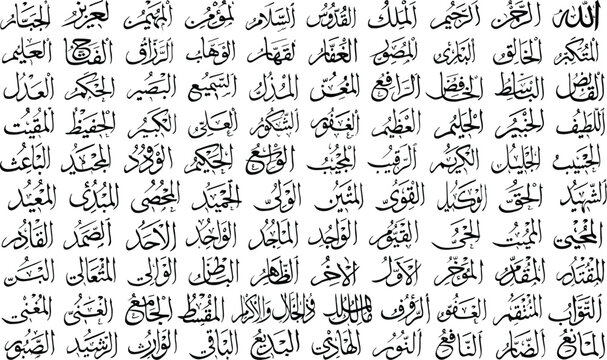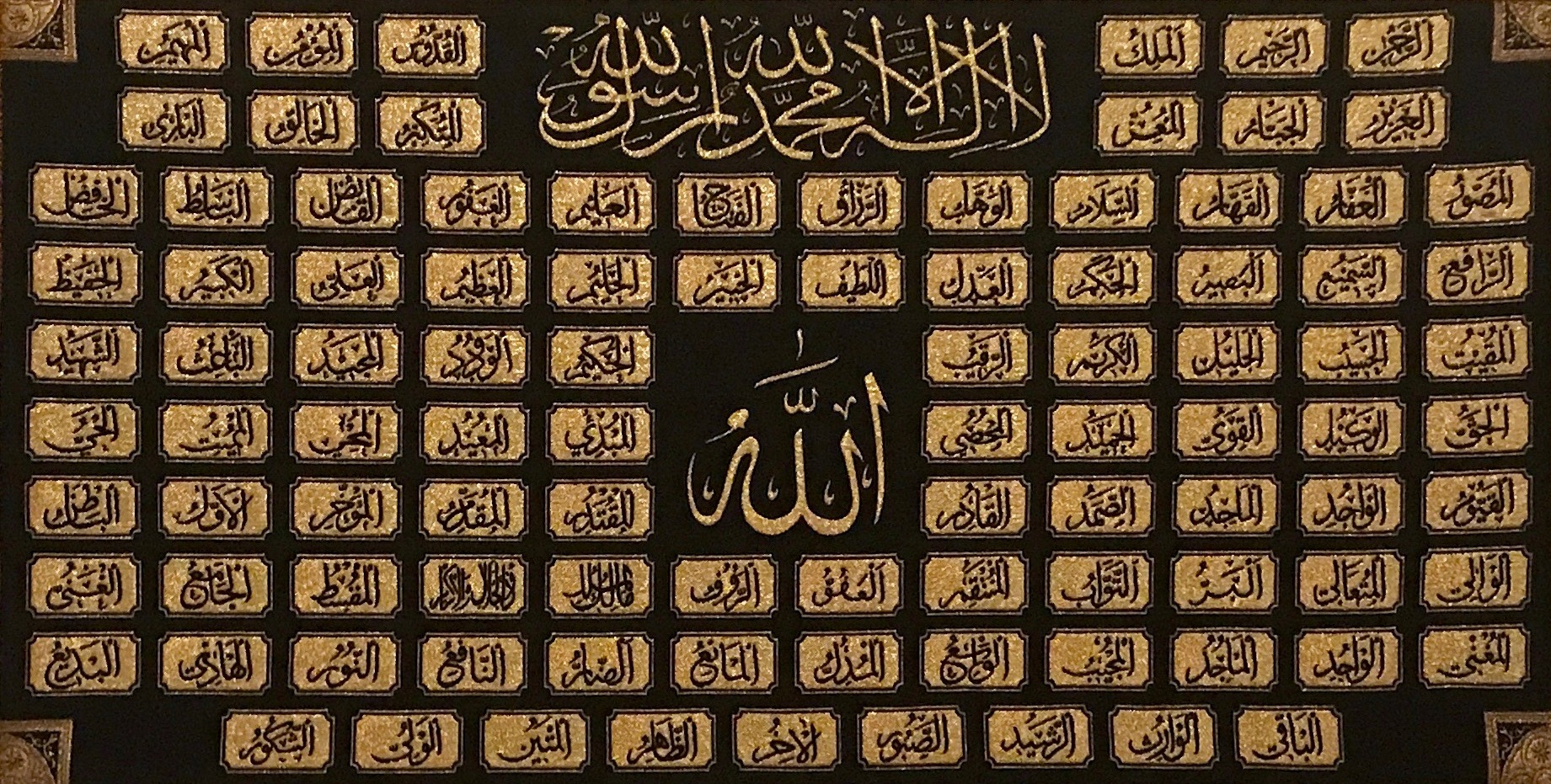The Names of God in Islam, commonly known as the 99 Names of Allah or Asma’ul Husna (الأسماء الحسنى), hold profound significance in the Islamic faith. These names each reflect unique attributes and qualities of God, helping believers understand and connect with the Divine on multiple levels. They are found across the Qur’an and Hadith and together form a comprehensive embodiment of Allah’s majesty, mercy, power, wisdom, and other essential characteristics. Believing in and invoking these Names is a spiritual practice that brings a Muslim closer to God, deepening faith and encouraging worship that is informed by an understanding of God’s nature.
Origins and Significance of the 99 Names
The tradition of the 99 Names of Allah comes from authentic hadiths, including those collected by al-Bukhari and Muslim ibn al-Hajjaj, where the Prophet Muhammad (peace be upon him) said: “God has 99 names, one hundred minus one; and he who enumerates them shall enter Paradise.” These names are not separate gods but attributes or titles describing the One God, Allah, the Arabic word meaning “The God” and the proper name for the singular, unique Creator and Sustainer of the universe. Each name expresses a specific quality of God revealed to humanity in scripture, and they encompass both His majesty and compassion.
The Names serve multiple spiritual functions. They are means of praise and glorification, inviting reflection on God’s perfection and uniqueness. They also guide Muslims in their supplications (duas) and prayers, as calling upon God by His Names strengthens the believer’s relationship with Him and fosters trust in His mercy and justice. Furthermore, by understanding these attributes, Muslims aspire to embody virtuous qualities such as mercy, justice, and patience in their own lives.
Categories of the Names and Attributes

The 99 Names can be grouped broadly into categories that highlight different aspects of God’s relationship with creation:
-
Merciful and Compassionate: Names like ar-Rahman (The Most Merciful) and ar-Raheem (The Most Compassionate) emphasize the vastness of God’s mercy which covers all of creation. This mercy extends to every being, sustaining life and offering forgiveness.
-
Sovereignty and Power: Names such as al-Malik (The King), al-Jabbar (The Omnipotent), and al-Aziz (The Almighty) emphasize Allah’s absolute dominion, control, and power over the universe. These names affirm God’s authority as the lord and sovereign ruler.
-
Knowledge and Wisdom: Names like al-Alim (The All-Knowing) and al-Hakim (The Wise) highlight God’s perfect knowledge and wisdom which no one else possesses. God’s awareness encompasses the entirety of existence.
-
Justice and Truth: Al-Adl (The Just) and al-Haqq (The Truth) display God’s perfect justice and the fact that He is the ultimate source of truth and fairness in judgment.
-
Protector and Provider: Names including ar-Razzaq (The Provider) and al-Muhaymin (The Guardian) show that God sustains all creatures and protects them from harm, ensuring balance and security in this world.
-
Other Essential Qualities: The Names also include al-Hayy (The Ever-Living), al-Qayyum (The Sustainer), al-Salam (The Source of Peace) and many others, each revealing a vital facet of God’s eternal existence and relationship with creation.
Read more: Scientific Miracles in Quran
Names of God in Islam
Spiritual and Practical Importance
Invoking the Names of God is a common practice in Islam — Muslims often recite these Names in their prayers, use them to supplicate for specific needs, and reflect on them to grow spiritually. For example, calling upon Allah as “al-Ghaffar” (The Forgiving) emphasizes hope for mercy after sinning, while “al-Halim” (The Forbearing) reassures believers of God’s patience amidst human errors.
Memorizing and understanding these Names also serves as an educational and spiritual exercise, encouraging reflection on God’s nature beyond superficial concepts. This nurtures a balanced view of God that encompasses both awe and closeness.
Throughout Islamic history, scholars and mystics have studied the Names extensively, linking them to theological and mystical concepts. Muslims believe that while these 99 names are known, Allah possesses an infinite number of other Names and attributes concealed from human knowledge, emphasizing God’s transcendence.
FAQs
Why are there exactly 99 Names of God in Islam?
The number 99 stems from a hadith reported by the Prophet Muhammad wherein he mentioned that God has 99 names, one hundred minus one. These names collectively represent key attributes of God revealed in the Qur’an and authentic traditions. Scholars explain that while these 99 are known and named, Allah’s total Names and attributes are infinite, but only these are emphasized for memorization and reflection.
Are the 99 Names of Allah mentioned in the Qur’an?
Most of the 99 Names appear directly in various verses of the Qur’an, describing God’s attributes such as mercy, power, knowledge, and justice. The Qur’an references the Most Beautiful Names (al-asmāʾ al-ḥusná) and lists many of these names explicitly or implicitly across different chapters.
How do Muslims use the 99 Names in worship?
Muslims often recite, memorize, and invoke these Names during prayers and supplications, believing that calling on Allah by His Beautiful Names brings blessings and closeness to Him. Each Name highlights a divine attribute relevant to the believer’s needs, such as seeking forgiveness from al-Ghaffar or seeking protection from al-Muhaymin.
What is the difference between the Name Allah and the 99 Names?
The Name Allah is the proper name of the one God, unique and indivisible, while the 99 Names are attributes or titles describing His qualities. Allah encompasses the entire divine essence, whereas the 99 Names express specific facets of that essence, helping believers understand and relate to God’s nature.
Can anyone know all the Names of God in Islam?
While Muslims are encouraged to learn and memorize the 99 Names revealed in the Qur’an and Sunnah, Islamic theology holds that there are infinite Names and attributes known only to Allah. The full knowledge of all Names is beyond human reach, and Muslims are instructed to believe in their existence without speculating beyond revealed texts.
Conclusion
The 99 Names of God in Islam represent a vital element of Muslim faith and worship. They provide believers with a means to approach and comprehend the Divine, offering a lens through which to view God’s multifaceted nature — as merciful yet powerful, just yet gracious, transcendent yet near. These Names enrich the spiritual lives of Muslims, underpinning their prayers and ethical behavior by reminding them of God’s omnipresence and perfect attributes. Thus, learning, reflecting, and invoking the Names of Allah is more than a ritual; it is a profound journey into the heart of Islamic monotheism that fosters devotion, humility, and trust in the Creator.

